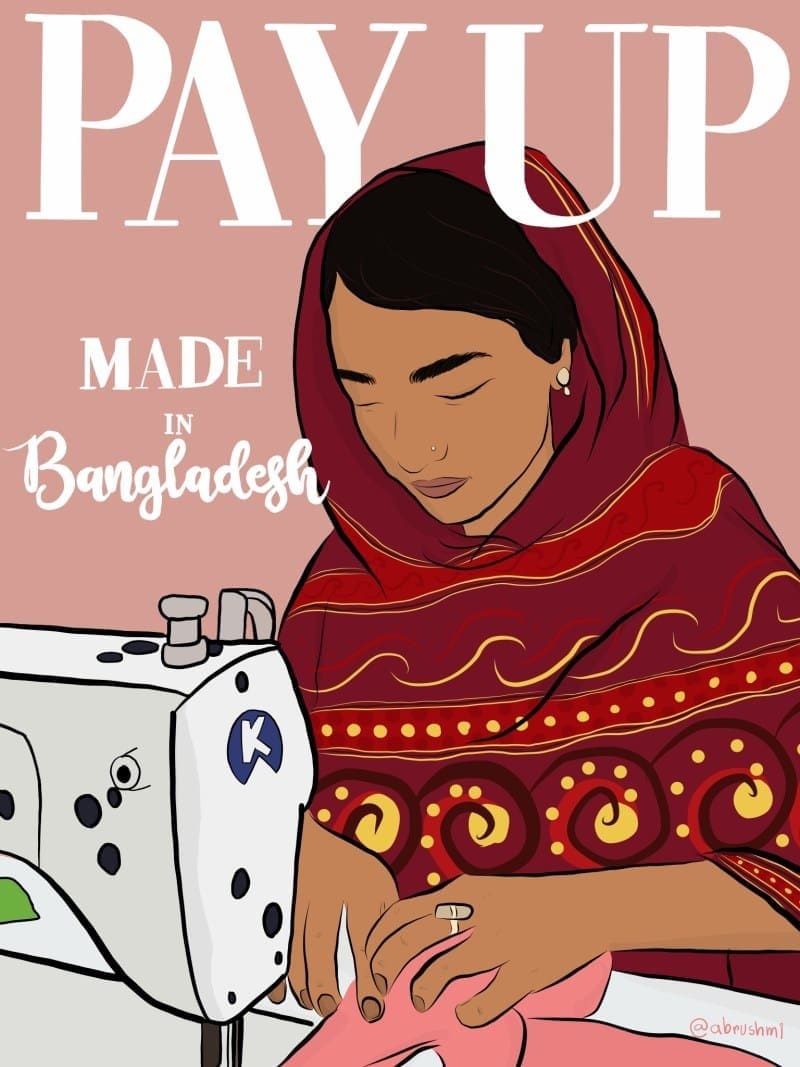#PayUp has been slowly gaining traction over the past few weeks on social media platforms like Instagram. A quick look through the posts will reveal that most of the discussion is surrounding the performative solidarity shown by brands in the wake of the ongoing Black Lives Matter movement and the lack of action by these brands when it comes to actually making a difference. So how do Bangladeshi RMG workers come into this?
#PayUp first emerged in the aftermath of the Rana Plaza tragedy in Bangladesh in 2013 which resulted in 1,134 deaths and 2,500 injuries. The movement began demanding international fashion brands show accountability towards their supply chains. It put pressure on the companies whose garments were being made in Rana Plaza to take note of the conditions in which the workers operate and to compensate those affected by the collapse. Since then it has evolved as a part of a greater movement promoting sustainable fashion.
The hashtag has recently emerged again amidst the pandemic, highlighting the lack of responsibility of many fashion brands who are trying to save their profits at the expense of their people due to many store closures and a reduction in sales. Many companies have refused to accept completed orders, demanded large discounts on completed orders and penalised delays in productions from Bangladeshi RMG factories since March 2020.
The fast fashion industry that we are so reliant upon is a result of economic manipulation and a legacy of colonialism. For many years, women in Bangladesh have been working in unsafe and dangerous conditions with little to no pay. They have sacrificed their lives simply for our summer trends and fast fashion. Many have not gotten their salaries for two months. Approximately 4.1 million Bangladeshi garment workers — 80 percent of whom are women — have not been paid, and are being exploited by Western brands such as Fashion Nova, Urban Outfitters, H&M, Target, Primark, Gap, Kohls, and Free People. This is not only a financial crisis, but a humanitarian crisis. These brands have capitalized off of underpaid and underprotected garment workers long enough.
Almost all of these brands complete their manufacturing offshores, often in developing countries using cheap labour. Here, the laws to protect the garment workers aren’t strong enough and hence, they get away with paying the workers less.
The brands don’t own any of the garment factories but provide work to them on a contract basis. The payment is only given to the garment factories once the order is manufactured and shipped to these brands, in the selling country.

With a legal minimum wage of $96 USD a month, garment workers in Bangladesh have been providing western people with their #OOTD. Only 14.8% of workers received full payment in April 2020 and many more of them risk being homeless.
The #PayUp movement has shown that many fashion companies are withholding up to $3bn USD from factories in Bangladesh for orders which have already been shipped, pushing 4.1 million people into extreme poverty.
Due to the COVID-19 pandemic, brands have cancelled an estimated £2.5bn of orders at more than 1,150 factories in Bangladesh alone. The countries garment industry has seen an 84% decline in orders. As a result, Bangladeshi garment workers continue to struggle. Those who have returned to work have gone back to the same cramped factory conditions that existed before the pandemic raising concerns over the health and wellbeing of the workers.
However, union representatives have said that a prolonged global recession may prove more deadly than the COVID-19 outbreak.

The Instagram hashtag #PayUp is being used to pressure those brands to pay for whatever they ordered from Bangladeshi factories. So far, sixteen brands have agreed to pay for back orders. H&M, Adidas, and Nike, Levis are among brands that have agreed to pay for back orders totaling some $7.5 billion.

As factories reopen, they’re fulfilling those orders. However, brands like Primark, Kohls, still refuse to pay. Kohl’s is yet to pay $50 million in cancelled orders in Bangladesh, in addition to the $100 million they are withholding from their other global suppliers. Primark is refusing to pay over $300 million to suppliers only in Bangladesh, according to BGMEA. On April 20, Primark announced a $460 million fund to pay suppliers worldwide, without mentioning what percentage of their dues they agreed to pay and has not made any of those payments yet.
How can we help?
There are many ways in which you can support the #PayUp movement and support those in Bangladesh. It includes:
- Calling out unethical brands and questioning them about their unsustainable practices;
• Learning about the trade deals and laws that mean workers in poorer countries can be exploited legally by brands in the west;
• Support the groups committed to changing this: Clean Clothes Campaign, Labour Behind the Label and Asia Floor Wage Alliance;
• Support ethical, sustainable and vintage brands; and lastly
• If possible donate to support garment workers at: supportgarmentworkers.org
While some say retailers and unethical factory owners are to blame, the factories say retail’s relentless push for cheap prices makes it impossible to improve. So although it is vital to hold companies to account for their actions, there also needs to be a shift in mentality towards how and where we shop. A sustainable movement in fashion is needed.

Article By:- Rutuja Shinde
Reference:
https://www.openaccessgovernment.org/bangladeshi-garment-workers/89939/
https://www.thedailystar.net/shout/news/its-time-payup-1920941

